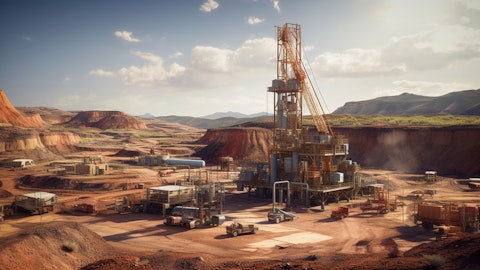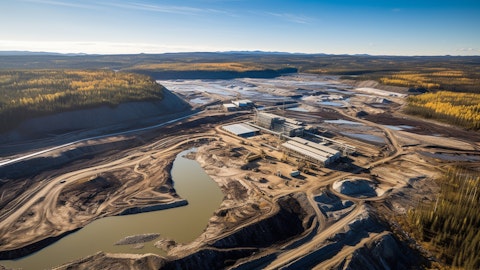Kathleen Quirk: Hey, Bennett.
Unidentified Analyst: If I could, I wanted to ask what, if any, is the company’s current dialogue with the new leadership in Indonesia and how you see that relationship developing over time.
Kathleen Quirk: Well, the transition doesn’t take place until October, and we’re continuing to work with the existing administration. We’ve got some matters that we’re working together on with respect to the concentrate license that we talked about earlier as well as the IUPK extension. And so we’re continuing to work with the current administration on these matters. We have a long history in Indonesia. We just celebrated 57 years of operation there. And we’ve worked with many governments over the years and many administrations. And we feel very confident that we’ll continue to have good relations with the new administration. And what we focus on, we’re not – we don’t get involved in politics. So we focus on what we do there to be a good citizen of Indonesia, to provide benefits to the national government, the local government, all of our workforce, the community and stakeholder work that we do there is very important and that’s – that lasts that survives administrations.
And so we really focus on the things that make the asset good for Indonesia and good for all the stakeholders. And that’s what we’ll continue. Richard, I don’t know if you want to add anything to those comments?
Richard Adkerson: Sure. I’ve been going to Indonesia now for all my career with Freeport over 35 years, and our relationships have never been better. I was just in Washington Friday evening for a reception to celebrate 75 years of positive relationships between the U.S. government and the Republic of Indonesia and the Finance Minister, Sri Mulyani and the Central Bank Governor Perry were there. And I wish you all could just hear the positive things that were set around this table of a number of companies and a number of Indonesian government officials about the current way that Freeport is viewed and how positive they see our partnership is in building PT-FI, which is an Indonesian company and to be in such a success for all the stakeholders.
Unidentified Analyst: Thanks. That’s helpful. And if I could just squeeze in one more on the topic regarding the future mining rates in Indonesia, we saw a headline last week that these could potentially be granted as soon as this upcoming June. So I’m wondering if there’s any updates you can provide there? And what additional ask maybe on the table from the government there?
Richard Adkerson: Let me just say that we have gotten – we have an agreement with the government on the structure beyond 2041. There’s no controversy over that, and there’s general support for it. The – I believe the fact that the election occurred and we just went through Ramadan is having an effect on the timing, but we’re very pleased. I mean it’s important to know that we currently under our existing permit have no rights to anything beyond 2041. And it makes no sense for any stakeholder to have this operation run without having a long-term plan for it in terms of doing more drilling to understand what resources are there, doing long-term planning or how those resources will be developed. The Indonesian – our Indonesian shareholder mines ID understands that.
The Ministry of Mines understands that the President’s Office does as well. So I’m confident we’re going to be able to get that. As always, there’s uncertainties as to when the actual formalities will be concluded to grant the regulations to allow us to continue. But there’s no real controversy about the structure going forward.
Kathleen Quirk: And delivery of the smelter is an important part of that. And the government is very pleased with the progress we’ve made in getting the smelter to a point where it can be commissioned next quarter – this quarter.
Unidentified Analyst: All right. Understood. Thank you very much and best of luck going forward.
Kathleen Quirk: Thank you, Bennett.
Richard Adkerson: Thanks, Bannett.
Operator: Your next question will come from the line of Lawson Winder with Bank of America Securities. Please go ahead.
Lawson Winder: Hi. Good morning.
Richard Adkerson: Good morning, Lawson.
Lawson Winder: Good morning, operator. Yes. Good morning Richard and Kathleen. Thank you for today’s update. Maybe just on Cerro Verde, if I could, is there still a pathway to consistently exceeding well over 400,000 tons per day at that asset?
Kathleen Quirk: Absolutely.
Richard Adkerson: I can’t tell you what a great job our team down there has done. I visited recently and I mean, just the spirit, the relationships with the local community. And as you all know, Peru is a very complicated country and has a lot of issues politically and economically to deal with, but it is just an uplifting experience to see what our team has done down there. I had some friends with me and to see an operation where we’re moving 400,000 – over 400,000 metric tons of material a day, that’s the equivalent of 80,000 street dump trucks moving material in a single day. And so it’s an inspiration quite frank, for me to see it. The community supports us. We’ve got a great workforce. We’re actually bringing some of our Peruvian operating people to work in Arizona and New Mexico to support our operations there, but it’s an uplifting place to go for me.
Kathleen Quirk: Lawson, it’s not without challenges this team has demonstrated, as Richard said, that they can – they’re very resilient team and can deal with a lot of different challenges. But water is something that is always a concern. We did with our expansion almost 10 years ago to put in a water treatment facility, and we provide clean water to the community, and it also supports our own operations. But particularly during this time where we’ve been through El Nino and droughts and there’s always a focus on water, but the ore is there, the resource is there, and the team has got – we’ve got the assets there and the team has got really good work practices. And as Richard said, the relationship with the community is top-notch.
Lawson Winder: Okay. That addresses my question. Thank you very much.
Richard Adkerson: Thank you.
Operator: Our next question will come from the line of John Tumazos from John Tumazos Very Independent Research. Please go ahead.
John Tumazos: Thank you very much. In the first quarter, the minority interest was $689, and the income to shareholders was $473. Could we interpret from that that the U.S. mines made about $200 million less profits than the overhead or the U.S. operations are losing money? And what are the short term remedies? For example, how quickly can you convert to autonomous drugs and mitigate wage inflation, et cetera?
Richard Adkerson: But one thing, John. Kathleen, let me say one thing to John before you answer the question, Kathleen. And I’ve seen some of your writings, John, and the minority ownership in PT-FI came about from the Rio Tinto deal in the mid-1990s, and that really hasn’t changed. That just was transferred to the government of Indonesia and that joint venture interest was converted to shares. But in 2018, Freeport, through the agreement that we reached, maintained virtually the same economic interest in the mine that we’ve had all along. So this wasn’t something that happened because of the government, but because of a deal that was cut back in the mid-1990s. And you know, the, when you look through it, and I talk with our Americas people and our people in the U.S. about it, because even though our mines in the U.S. are low grade, because of the fact we have a very favorable income tax situation in the U.S., bolstered by net operating loss carryforwards, we own our lands in fees, so there’s no royalties.
We get community support for schools and hospitals and our workers. We don’t have to provide for the same things we do overseas that we do overseas. And so the profitability of those mines is really very attractive. And that’s what makes these growth opportunities in the U.S. so attractive for Freeport. You and I both remember a time when people thought the Southwest copper district was dead. And right now it’s a big part of the future for our country in terms of providing the copper resource needed for the energy transition and electrification broadly. But also it’s a great opportunity for our shareholders to create value for Freeport, to create value for our shareholders.
Kathleen Quirk: John, I was just going to point you to the press release. There’s some, in the back of the press release, there’s some segment analysis, and you can look at the segments we show, how much the U.S. mines contributed, etcetera. And if that doesn’t answer your question, just follow up with us afterward.
John Tumazos: Thank you.
Operator: Our last question will come from the line of Martin Malloy with Johnson Rice and Company. Please go ahead.
Kathleen Quirk: Hi, Marty.
Martin Malloy: Good morning. I wanted to ask, with your leaching technology, does that give you a competitive advantage and maybe looking at acquisition opportunities?
Kathleen Quirk: Well, we’re focused on – I mean, we’ve got almost 40 billion pounds in our own in our inventory. And that doesn’t include some really old areas where we’re not active. But yes, I mean, to answer your question, it does give us some interest in some things that may have this opportunity to be able to apply our know-how to it. But we’re really focused on our own organic situation. If an opportunity came available that had this, we would be interested in seeing what we could make out of it. But we’ve got a lot within our portfolio to be able to get substantial value for our shareholders from.
Richard Adkerson: Yes. And a lot is understating it. It is massive, what we have the opportunity to develop from what’s already owned by Freeport from our existing stockpiles and Kathleen mentioned our historical stockpiles. So yes, an opportunity came along, but I’m not expecting it. I think that we’re going to be able to grow tremendous amounts of value doing with what we have, which now the company really has, others have opportunities. No one else has it in this kind of scale that we do.
Martin Malloy: Thank you.
Operator: With that, we’ll turn the call over to management for any closing remarks.
Kathleen Quirk: Thanks, everyone, for all your good questions today and your interest in Freeport, and we look forward to reporting in the future on our progress.
Richard Adkerson: Thank you, all.
Operator: That concludes our call for today. Thank you all for joining, and you may now disconnect.
Follow Freeport-Mcmoran Inc (NYSE:FCX)
Follow Freeport-Mcmoran Inc (NYSE:FCX)
Receive real-time insider trading and news alerts




